Controversy and Collapse: The Greg Chappell Era in Indian Cricket
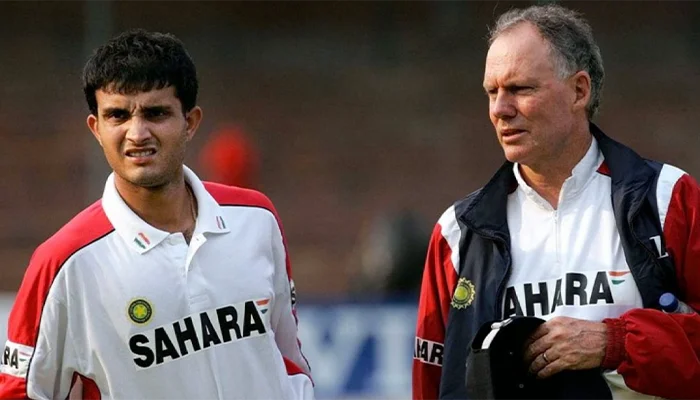
(Sourav Ganguly and Greg Chappell in a frame)
Whenever there is a story of the darkest chapters of Indian cricket, then the name that will appear at the top of the list will always be Greg Chappell who destroyed the dream of winning the ICC ODI World Cup 2007 for the Indian fans and the players. Besides this, the story of Greg Chappell and the former Indian captain Sourav Ganguly is something that every Indian fan remembers because of the way this whole chapter unfolded. Considering all this, we will be listing down how Greg Chappell entered the Indian cricket team as a coach and went on to get the divide-and-rule policy which ultimately changed the way for the fans to see Indian cricket.
Greg Chappell’s career with the Australian team
It was the year 1966 when the Australian team got the Chappell brothers (Ian and Greg) into the team because of their domestic performances and the way they played during those years. Starting in 1969, Greg Chappell began his cricketing adventure filled with ups and downs. Despite initial difficulties, he showed his skills during a trip to New Zealand, where he was the best batsman, scoring 519 runs at an average of 57.70. With the Australian Test team not doing well in South Africa, Chappell aimed to get into the team to play against England in the 1970–71 Ashes Series.
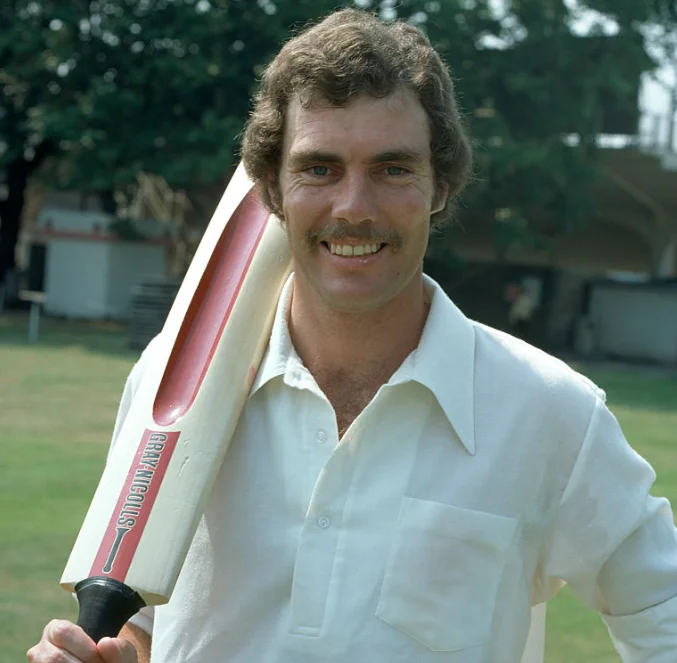
(Greg Chappell during his playing days for the Australian team)
He got his chance in the second Test at Perth's WACA ground and made history by scoring a century on debut. However, his form became inconsistent afterwards, and he was left out of the team for a series against the Rest of the World XI. Facing criticism, Chappell changed his approach, focusing his shots in a narrow area between mid-off and mid-on. This adjustment brought success, including impressive scores in subsequent matches and a crucial innings during the 1972 Ashes tour of England, where he helped Australia level the series.
(Greg Chappell’s career runs for the Australian team)
|
FORMAT |
Matches |
Innings |
Runs |
Highest Score |
Average |
100s |
50s |
|
Tests |
87 |
151 |
7110 |
247* |
53.86 |
24 |
31 |
|
ODIs |
74 |
72 |
2331 |
138* |
40.18 |
3 |
14 |
From 1981, Greg Chappell opted out of most overseas tours, leading to Kim Hughes taking over the captaincy for the 1981 and 1982 tours of England and Pakistan, respectively. However, Chappell reclaimed the captaincy for the Australian summers of 1981–82 and 1982–83. His leadership came to a close in 1983, marking his retirement as captain. The transition occurred during his last test series (1983–84), where he played under Hughes' captaincy. This shift in leadership dynamics marked a significant era in Australian cricket, reflecting the team's adaptability and the emergence of new leadership styles.
Becoming the coach of the Indian team
In 2005, India’s coach John Wright’s coaching tenure came to an end and the team was now looking for someone who would help them to reach at the top of the game. This is where Greg Chappell was selected to become the coach of the team with a contract spanning for two years and taking a sum of US$175,000 per year. With his success as a player and performing well as a coach, it was the perfect role for him to guide the Indian team for the 2007 ODI World Cup as in the last World Cup, India lost in the Finals and was now looking to get one step ahead.
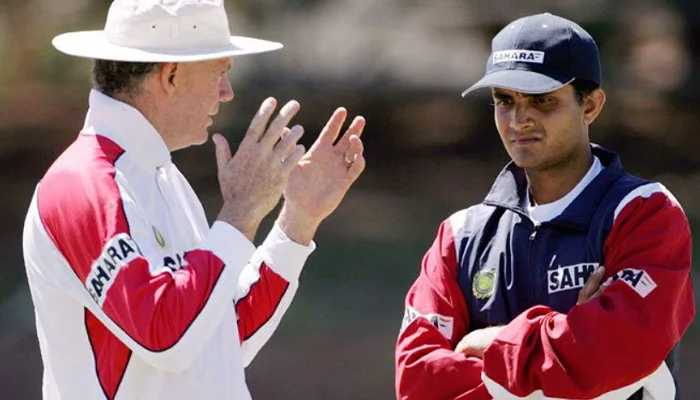
(Sourav Ganguly and Greg Chappell in a discussion during India’s team practice)
Sourav Ganguly, the Indian captain, played a crucial role in advocating for Chappell's appointment. Ganguly, who had previously benefited from Chappell's batting guidance during the successful 2003-04 tour of Australia, supported Chappell's candidacy twice in April 2005, without consulting other senior team members. Chappell's arrival sparked considerable interest in the Indian media, thanks to his commanding personality. However, his strong demeanour clashed with Ganguly's established reputation as a resilient and effective captain.
Fall-out with Ganguly and other teammates
During the tour of Zimbabwe, Greg Chappell urged Sourav Ganguly to relinquish the captaincy and focus on his batting due to a perceived slump in form. This request led to Ganguly's decision to leave the tour. Despite efforts from team management, including Chappell and Rahul Dravid, to persuade him to stay, Ganguly departed. Rumours swirled that Ganguly had feigned an injury during a match, which he vehemently denied, accusing team management of pressuring him to step down as captain.
Reports emerged of Chappell considering resignation, but he dismissed them, asserting that his discussions with Ganguly were aimed at motivating him. However, Chappell's subsequent email to the Board of Control for Cricket in India (BCCI) criticized Ganguly's fitness and attitude, accusing him of hindering the team's progress for the 2007 World Cup. This email leaked, leading to both Ganguly and Chappell being summoned to a BCCI meeting.
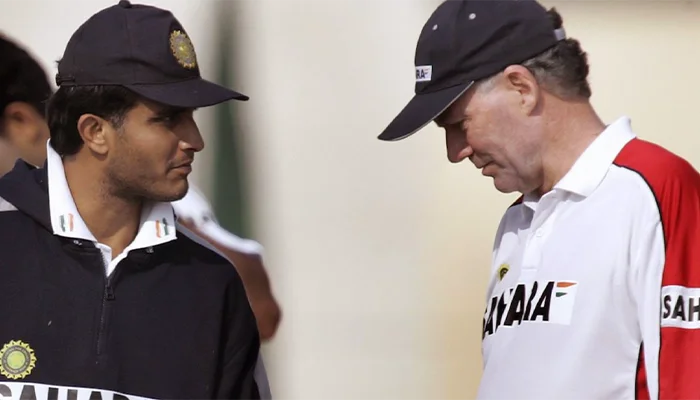
(During the Zimbabwe tour, Sourav Ganguly and Greg Chappell were often involved in heated exchanges)
At the meeting, they resolved to work together for the betterment of Indian cricket. However, dissent within the team surfaced when Harbhajan Singh publicly criticized Chappell, defending Ganguly. This led to Harbhajan facing scrutiny from cricket authorities but avoiding punishment after apologizing. Numerous team members reportedly supported Ganguly and expressed dissatisfaction with Chappell's handling of the situation, prompting a gag order on team members from speaking to the media.
In October 2005, Sourav Ganguly got injured, making him miss the first four ODIs against Sri Lanka. Rahul Dravid stepped in as captain, leading India to a 4–0 series lead. When changes were made for the remaining matches, Ganguly wasn't picked, and Dravid continued as captain. The situation led to public protests in Calcutta, where fans expressed support for Ganguly and anger towards coach Greg Chappell. During a match against South Africa, the crowd booed the Indian team and cheered for the opponents. Yuvraj Singh, vying for a spot with Ganguly, became the centre of attention after a successful performance.
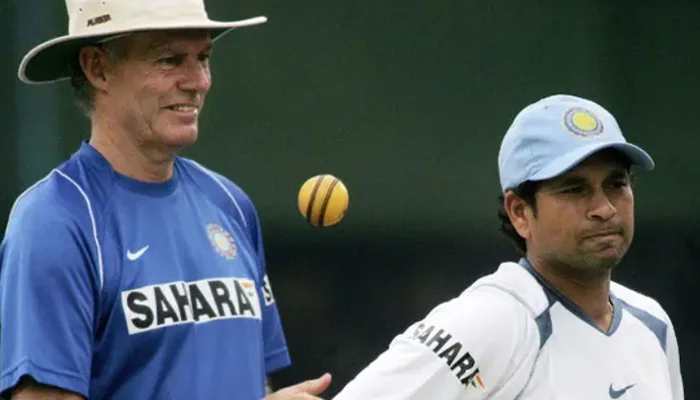
(Greg Chappell and Sachin Tendulkar during the Sri Lanka Test series)
Despite being included in the Test squad against Sri Lanka, Ganguly faced criticism for his bowling skills. The debate over Ganguly's inclusion intensified when former selector Yashpal Sharma accused Chappell of meddling in team selection. During the Test series, Ganguly's performance was scrutinized, especially in comparison to Yuvraj's. Ganguly was eventually dropped from the team, sparking sympathy and protests in Calcutta. Despite his omission from both ODI and Test teams, Ganguly retained his top-tier BCCI contract, while Yuvraj and Mohammad Kaif, who replaced him, were on a lower tier.
In summary, Ganguly's captaincy and place in the team faced uncertainty due to injury, performance concerns, and reported conflicts with the coach. His omission from the team led to widespread support and protests in his favour, highlighting his enduring popularity despite on-field challenges. For the fans, the omission of Sourav Ganguly was a hard one and hence it was the time when the fans started seeing that Greg Chappell was destroying the Indian team.
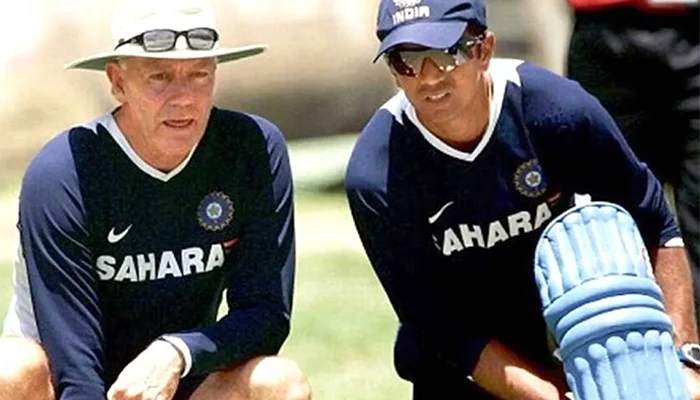
(Greg Chappell and Rahul Dravid during the Sri Lanka Test series)
In an interview, Sourav Ganguly even claimed that Greg Chappell is a mad person who just ruined Indian cricket during his tenure. He further said that:
“When he came to India, it was said that his Australian mindset won't work here but he couldn't work in the Australian set up as well. People should realize that the problem lies with him; he is the one making mistakes. A person can be wrong once but if he commits the same mistake again and loses his job for that, then that man to me is mad. So, I am glad that he is getting attached to the Australian team, it is good news for the Indian team. I am not surprised."
How Greg Chappell ruined India’s 2007 ODI World Cup chances?
For the 2007 ODI World Cup, India started as the favourites because of the team that they had formed during the last 3 years. With players like Sachin Tendulkar, Rahul Dravid, MS Dhoni, Sourav Ganguly, and others, everyone thought that this team had the perfect chance to lift the World Cup after 1983. However, just before the World Cup, Greg Chappell changed the entire batting lineup order of the Indian team which made things difficult for the batters out there to adapt.
Even during boarding the flight for the ODI World Cup while leaving India, a few players felt that the environment of the dressing room wasn’t good and the team might not be able to do well. India's journey in the World Cup hit a rough patch with a surprising loss to Bangladesh in their first match. Despite Sourav Ganguly's solid 66 runs, people weren't happy with his slow scoring. The team bounced back against Bermuda, scoring over 400 runs, with Ganguly making 87 runs. But the media kept criticizing both the team and its leaders.
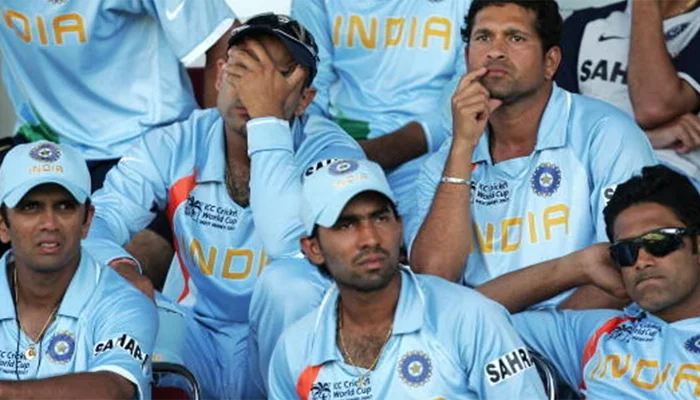
(Indian team devastated after losing the 2007 ODI World Cup)
In a do-or-die game against Sri Lanka, India had to win. But Sri Lanka set a tough target of over 250 runs. India's batting struggled, leading to a big defeat. Although not officially out until Bangladesh won their last game, India's World Cup dream was over after the loss to Sri Lanka. With fans and media upset and the cricket board not offering much support, Greg Chappell stepped down as India's coach. His resignation marked the end of a difficult time for Indian cricket, showing how high the stakes are and the pressure on those in charge. Despite the disappointment, it's a reminder of the ups and downs in sports and how fans and media play a big role in shaping the narrative.
Furthermore, expressing his views on the 2007 ODI World Cup exit, Virender Sehwag said that it was disappointing to see the team being at this low. He even added that some players cried while being in the dressing room and it wasn’t good for the team.
“The 2007 World Cup hurt more. Because our team in 2007 was the best team in the world. If you were to look for a better team on paper, you wouldn't find it before or after the World Cup. In the previous edition, we played the final, in the next edition, we won the World Cup, but it was not this team. So this hurt the most as we lost 2 out of our 3 matches. And the win also came against Namibia. And we got knocked out.”
Indian Players Reflect on Greg Chappell's Coaching Era
With the resignation of Greg Chappell, the Indian team appointed Ravi Shastri as an interim coach and they managed to create a team that went on to win the 2007 T20 World Cup. However, considering Chappell’s resignation, Sourav Ganguly was back in the team and even managed to make his performances speak. In his autobiography "Playing It My Way," Sachin Tendulkar delivered a scathing critique of Greg Chappell, portraying him as an authoritarian figure who imposed his strategies on players without considering their well-being.
Tendulkar particularly lambasted Chappell's treatment of Sourav Ganguly, a highly respected figure in Indian cricket, suggesting that Chappell failed to appreciate Ganguly's instrumental role in securing his coaching position. Additionally, Tendulkar alleged that Chappell once approached him to assume the captaincy, implying a power play to exert control over Indian cricket.
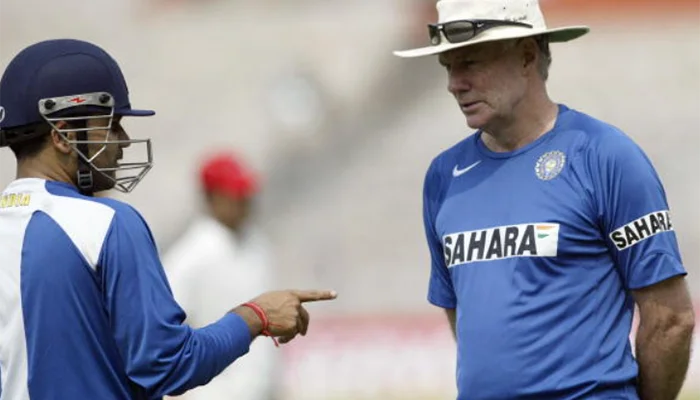
(Virender Sehwag with Greg Chappell in India’s practice session)
Tendulkar's allegations found resonance among former teammates such as Zaheer Khan, Harbhajan Singh, and V. V. S. Laxman. Khan characterized Chappell as a "control freak," recalling instances where Chappell threatened players' positions within the team. Harbhajan echoed Tendulkar's sentiments, accusing Chappell of fostering discord within the team through divisive tactics and misinformation.
Laxman criticized Chappell for impeding India's cricketing progress during his tenure, citing instances of questionable decision-making and player management. In 2015, Mohammad Kaif revealed how Chappell's criticisms adversely affected his fielding performance, leading to a loss of confidence. Ashish Nehra echoed similar sentiments, highlighting the tumultuous atmosphere created by Chappell's leadership.
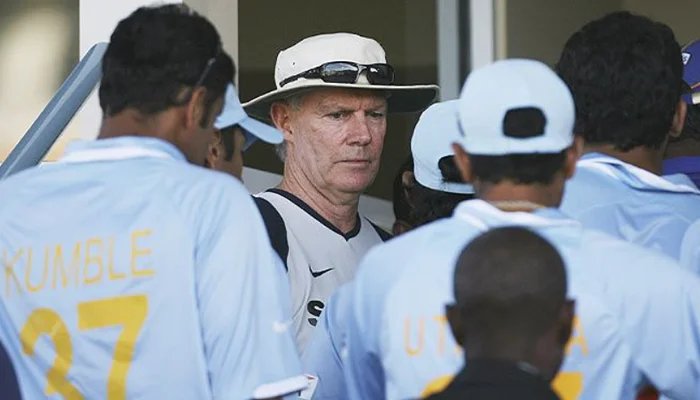
(Greg Chappell disappointed after India’s poor performance in the 2007 ODI World Cup)
Virender Sehwag talked about his role in informing Ganguly about Chappell's contentious email, expressing discomfort with Chappell's lack of discretion and ineffective leadership style. In June 2020, Harbhajan Singh denounced Chappell's divisive policies during the 2007 World Cup, deeming it a low point in his career.
He questioned Chappell's motives and leadership, criticising his strategies and their detrimental impact on Indian cricket. Collectively, Tendulkar and his former teammates' testimonies present a damning portrayal of Chappell's coaching tenure, characterized by authoritarianism, interpersonal conflicts, and a failure to foster team cohesion.

Comments
Sign up or log in to your account to leave comments and reactions
0 Comments